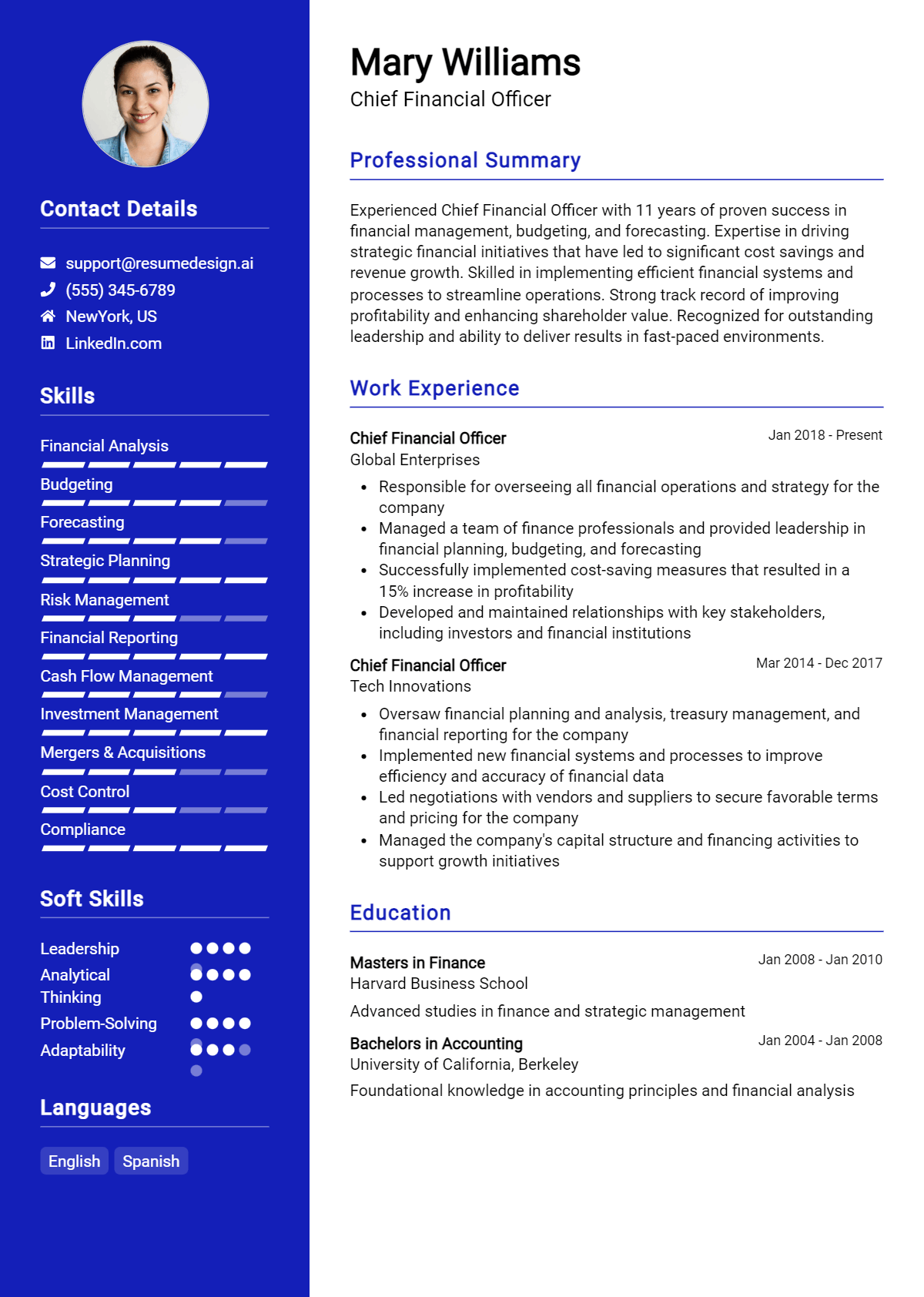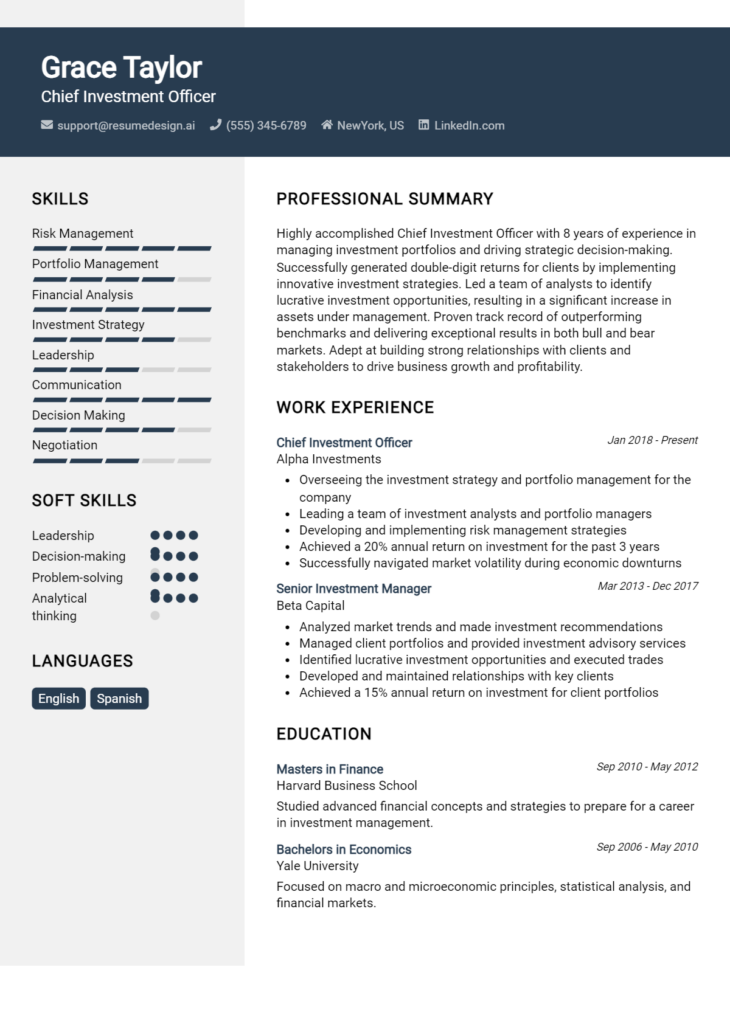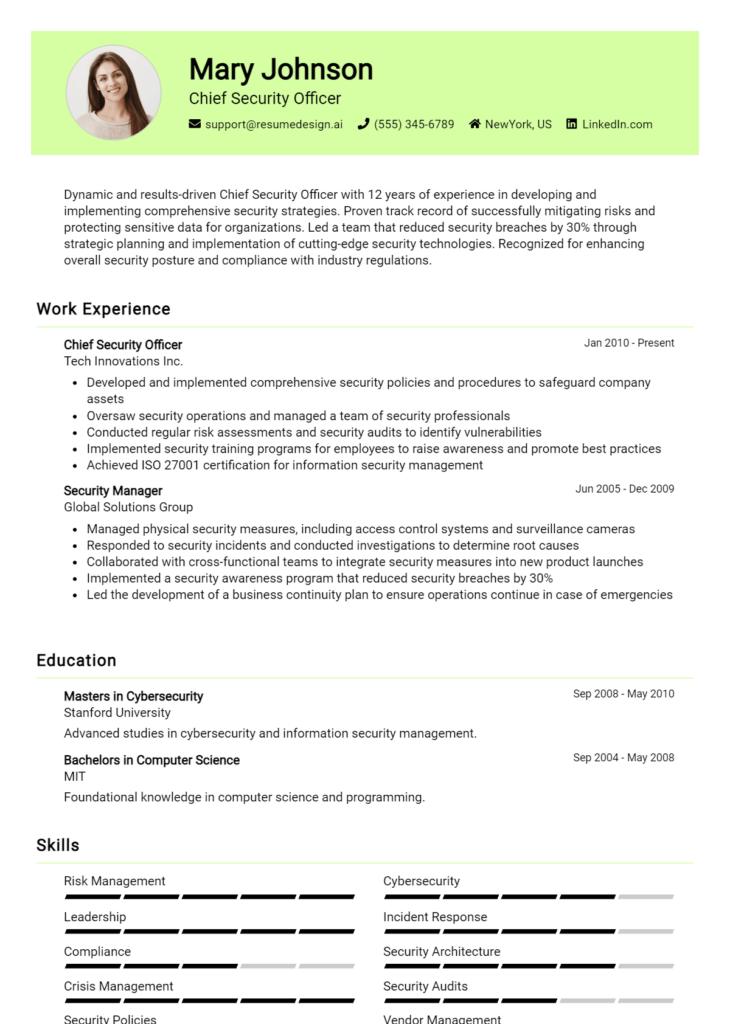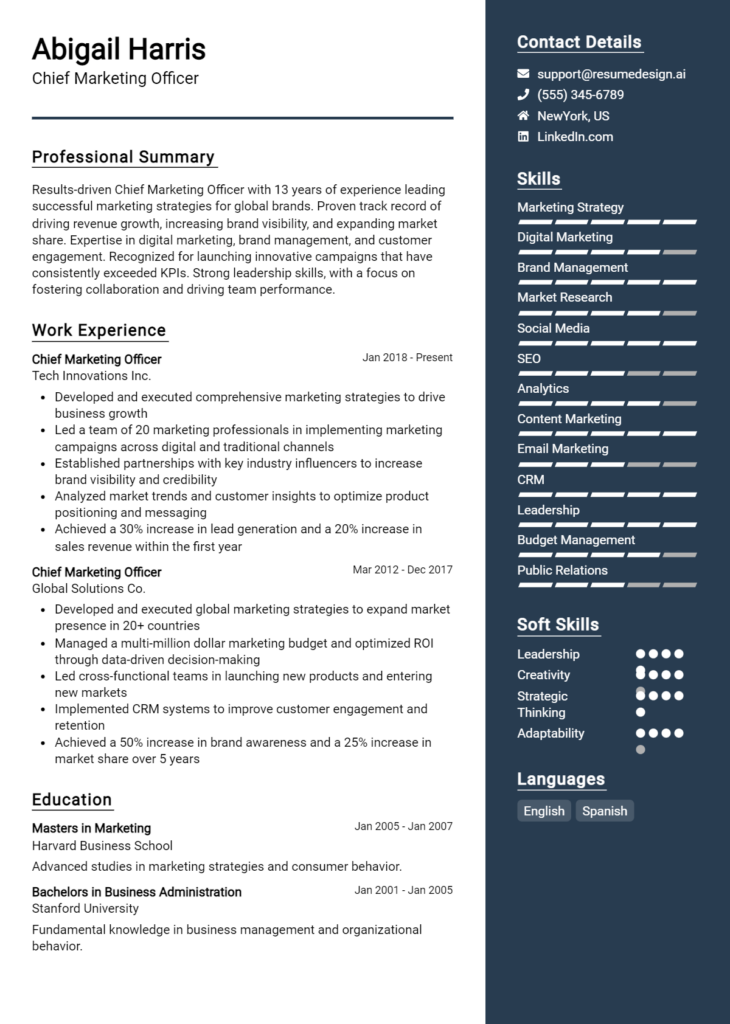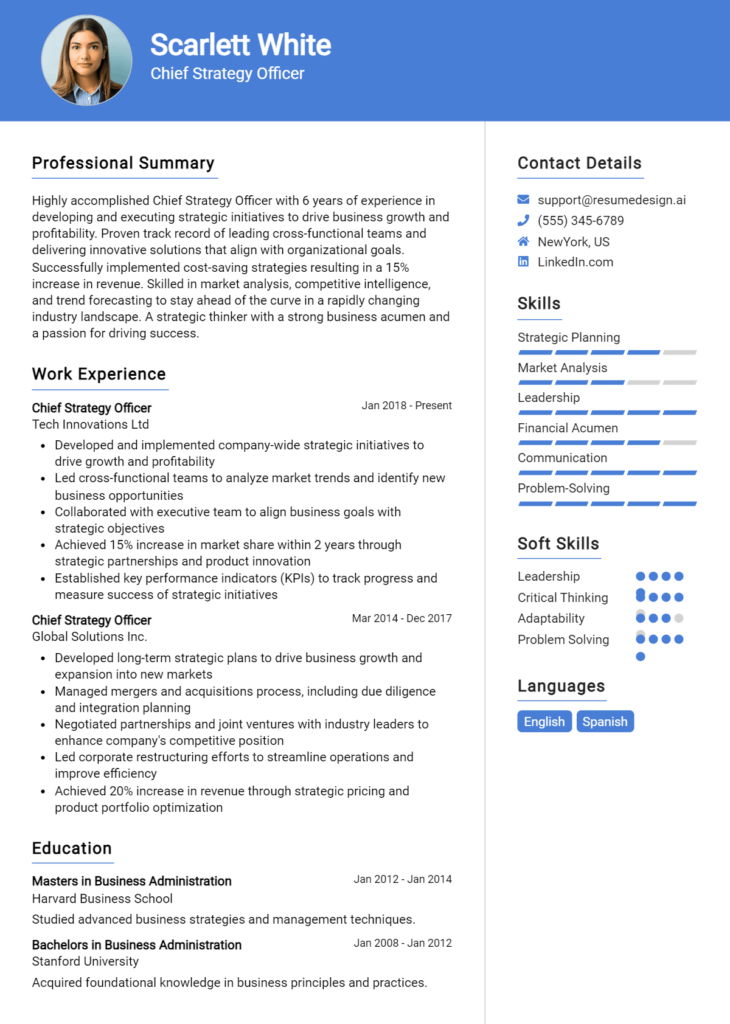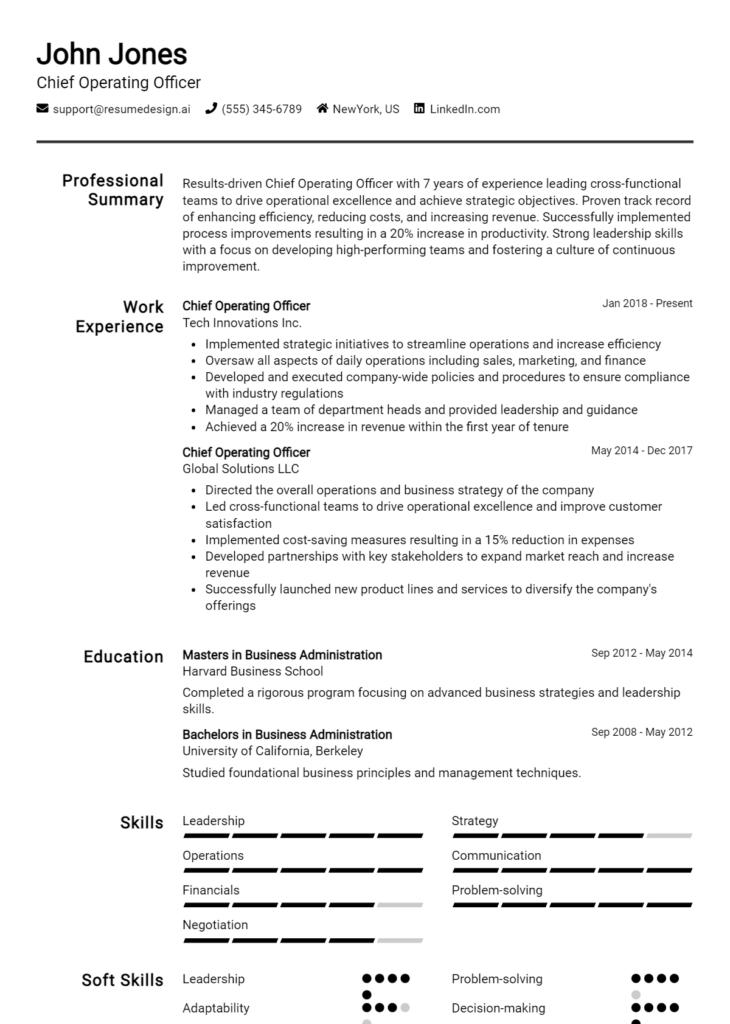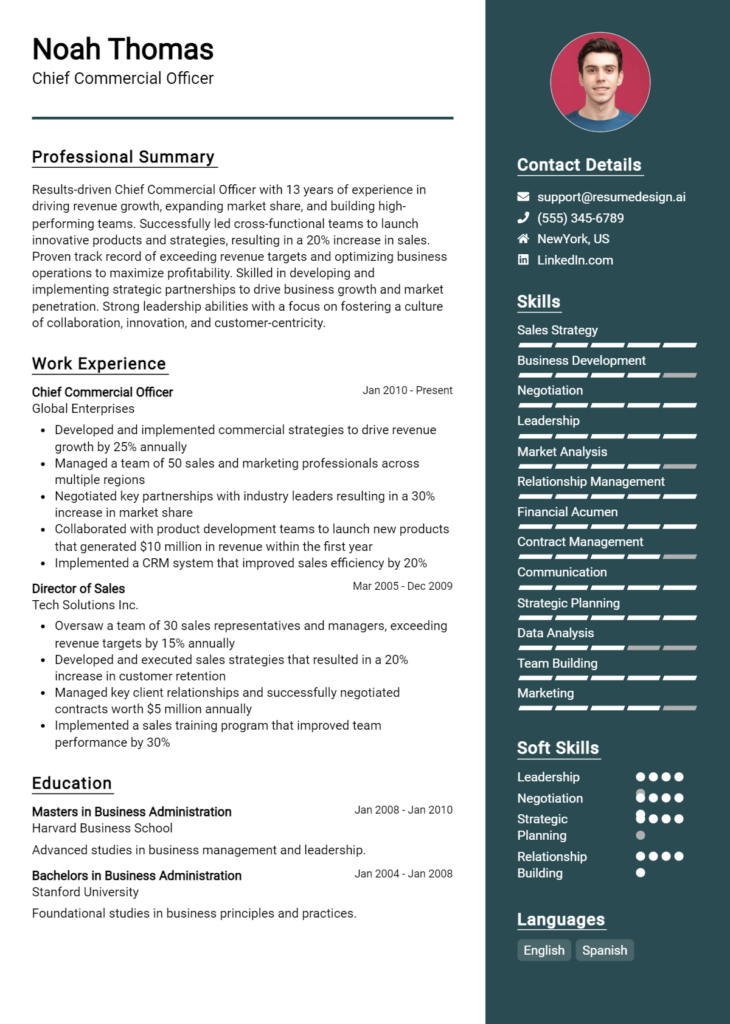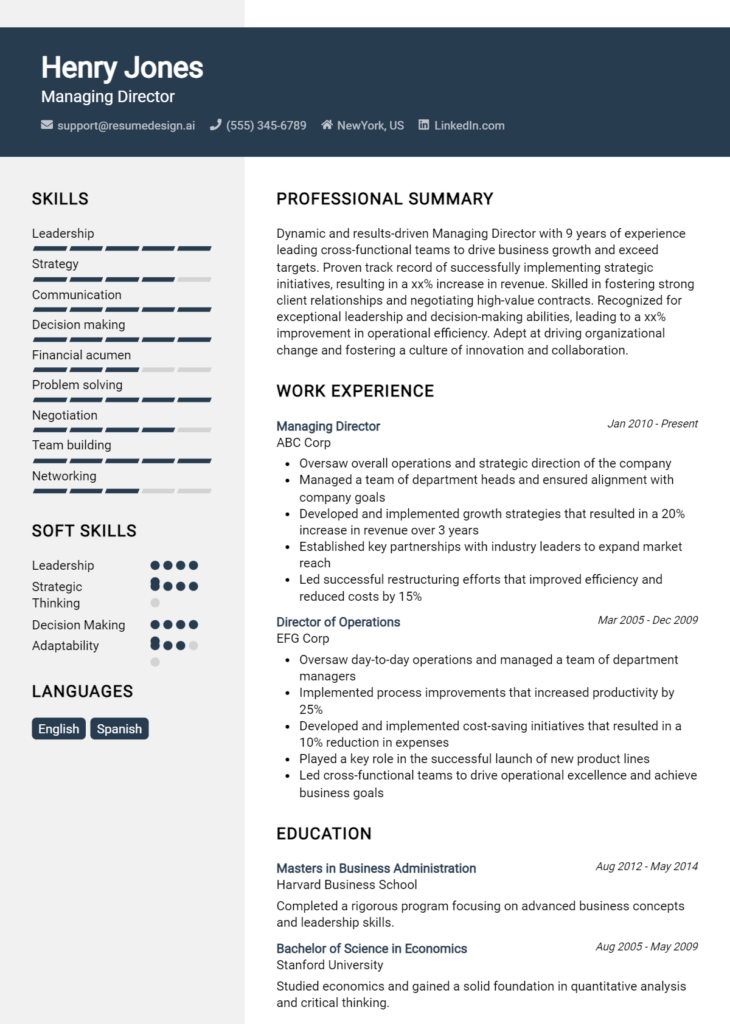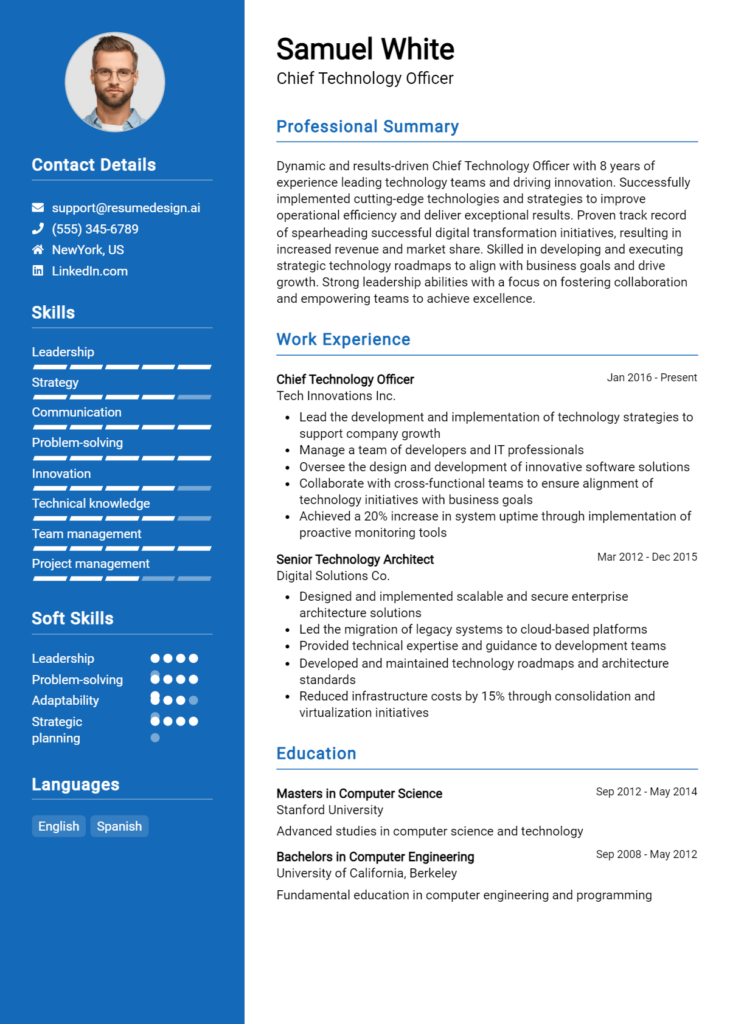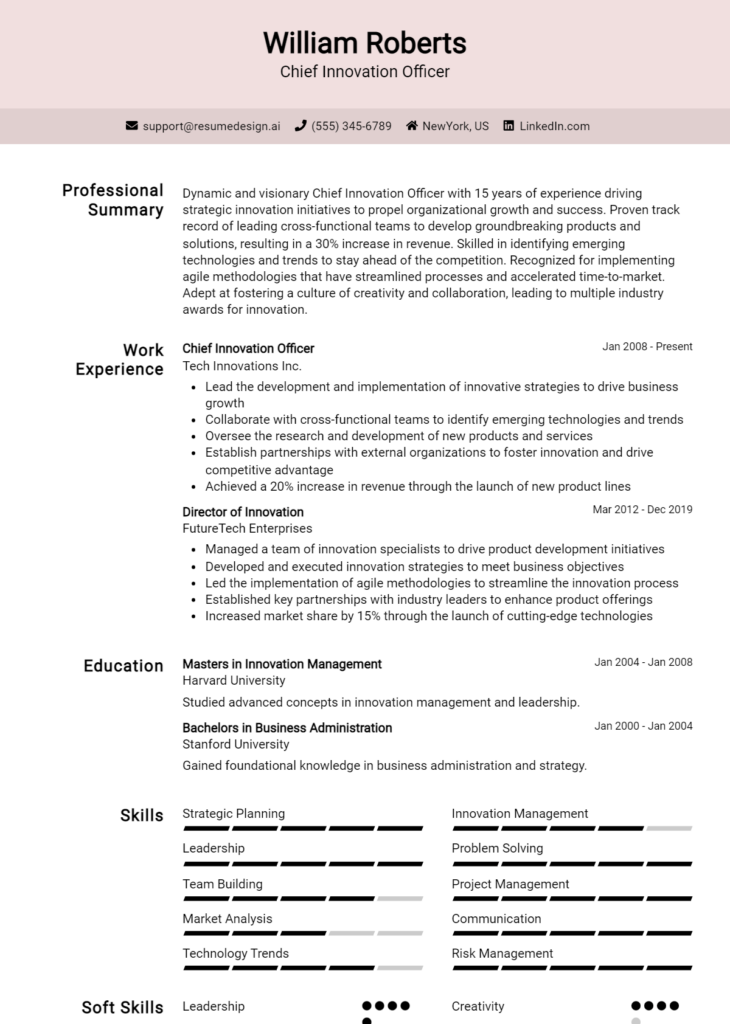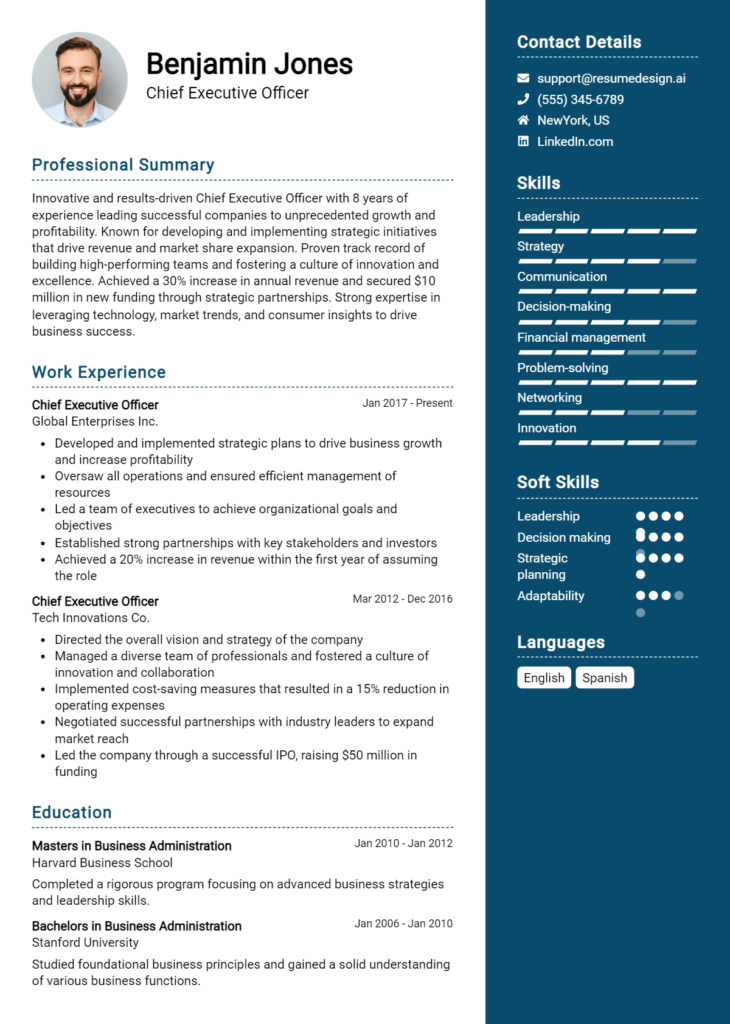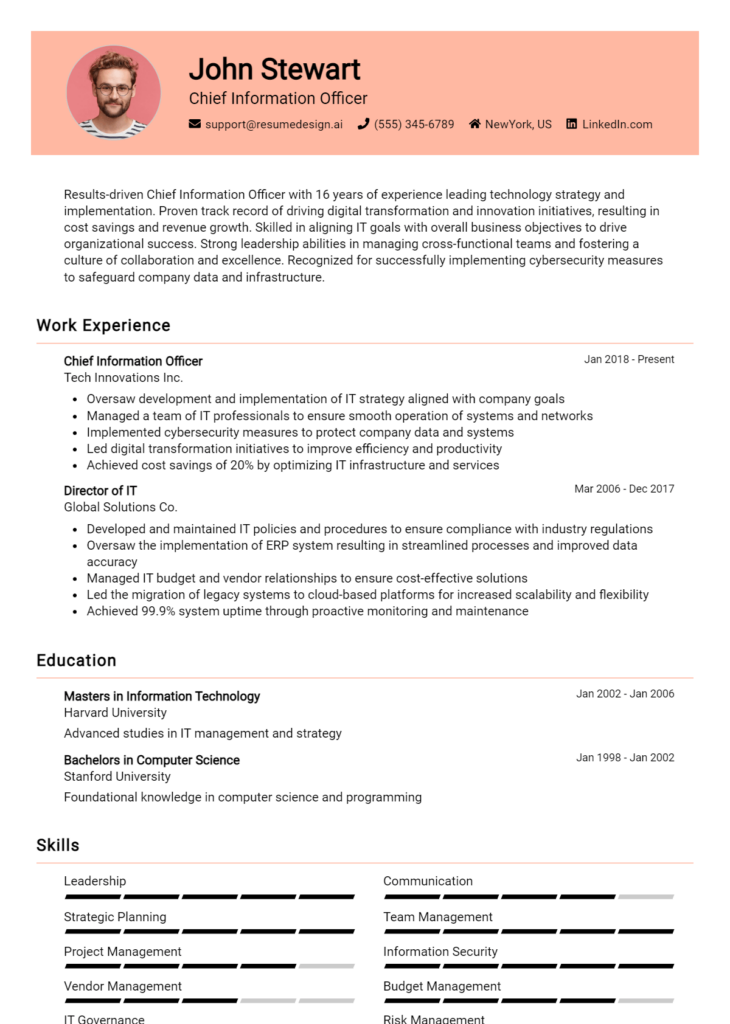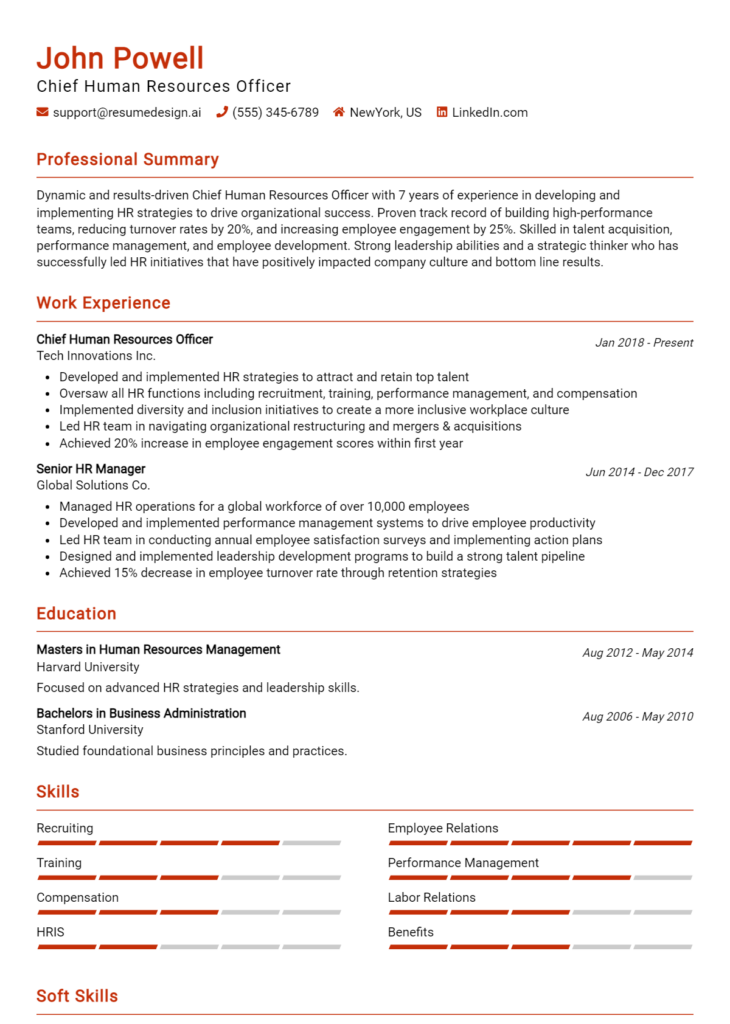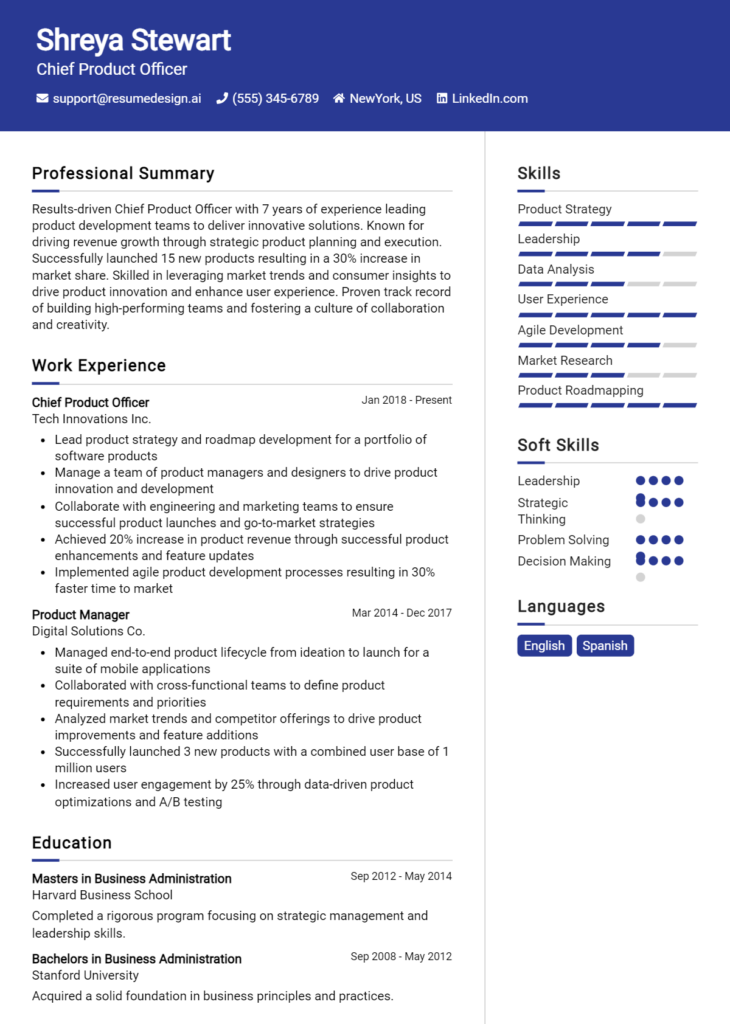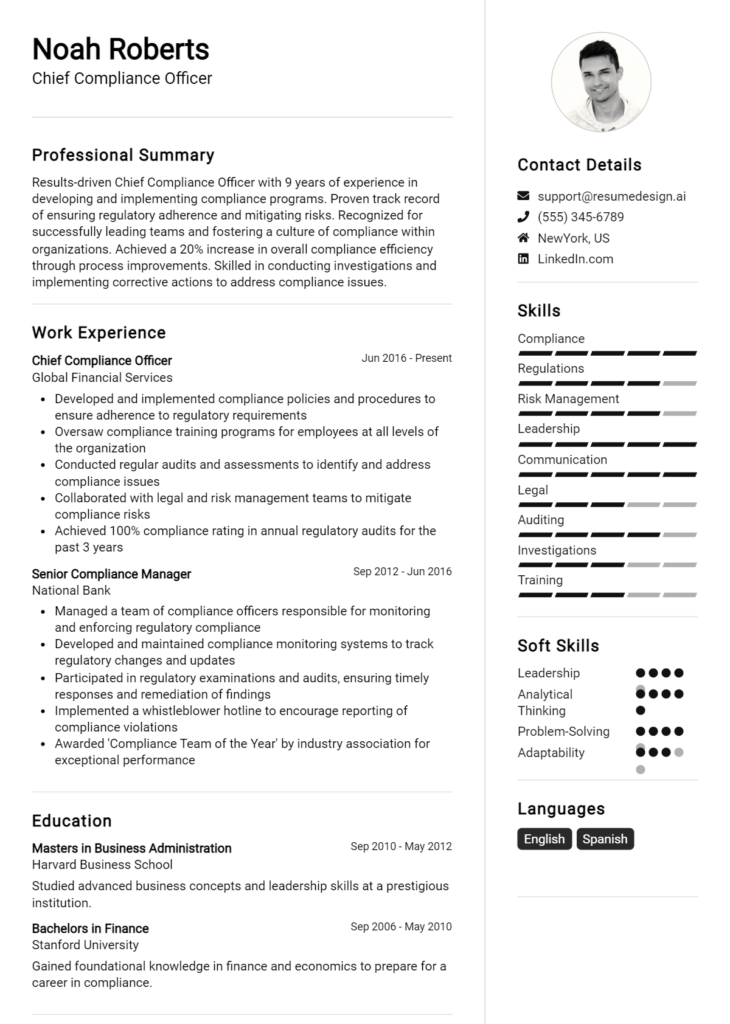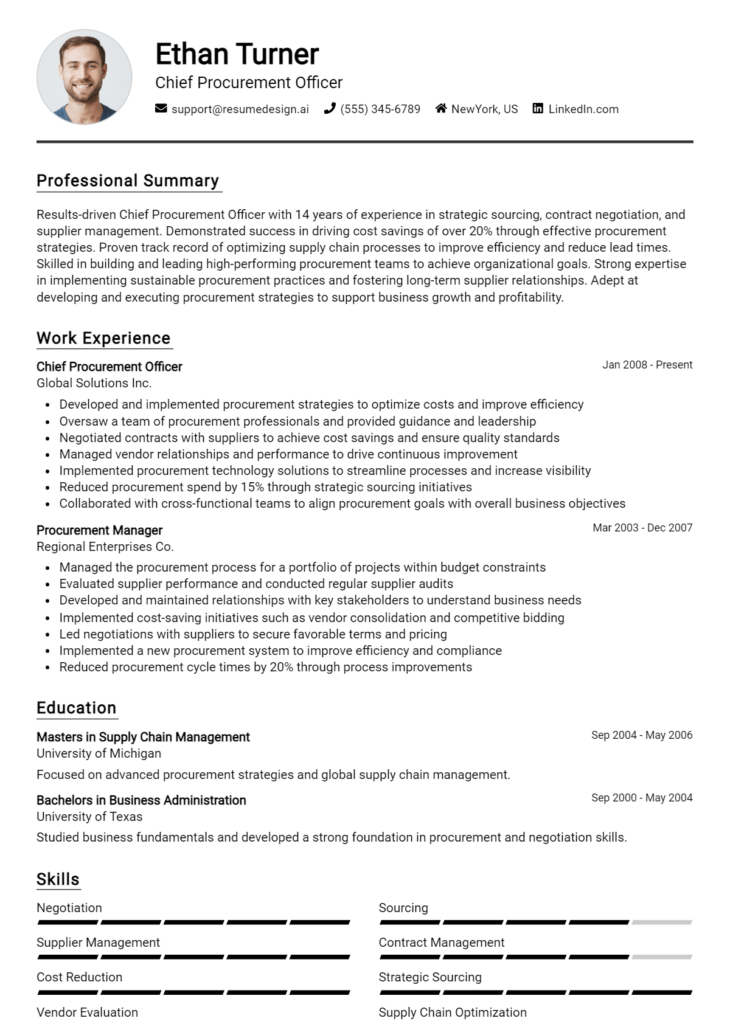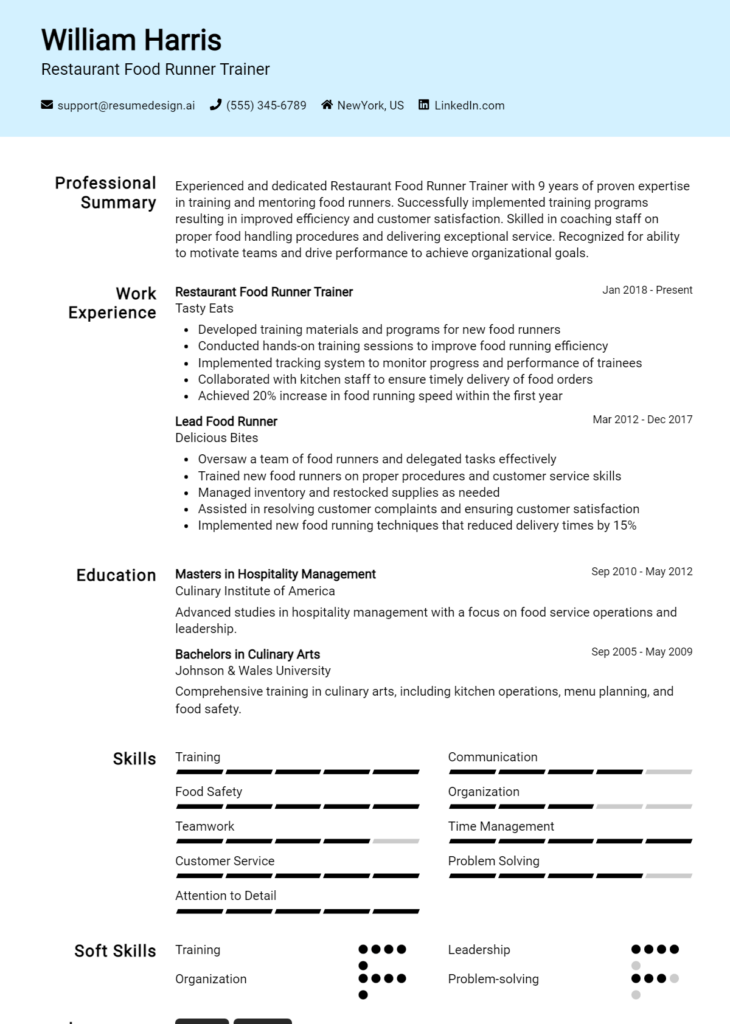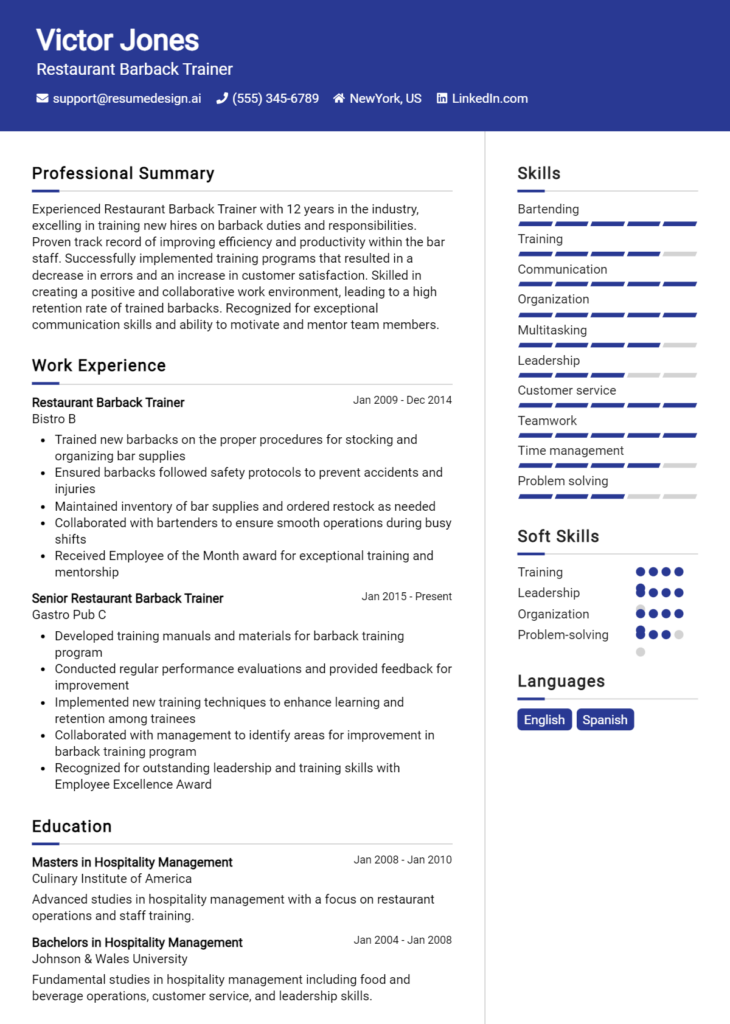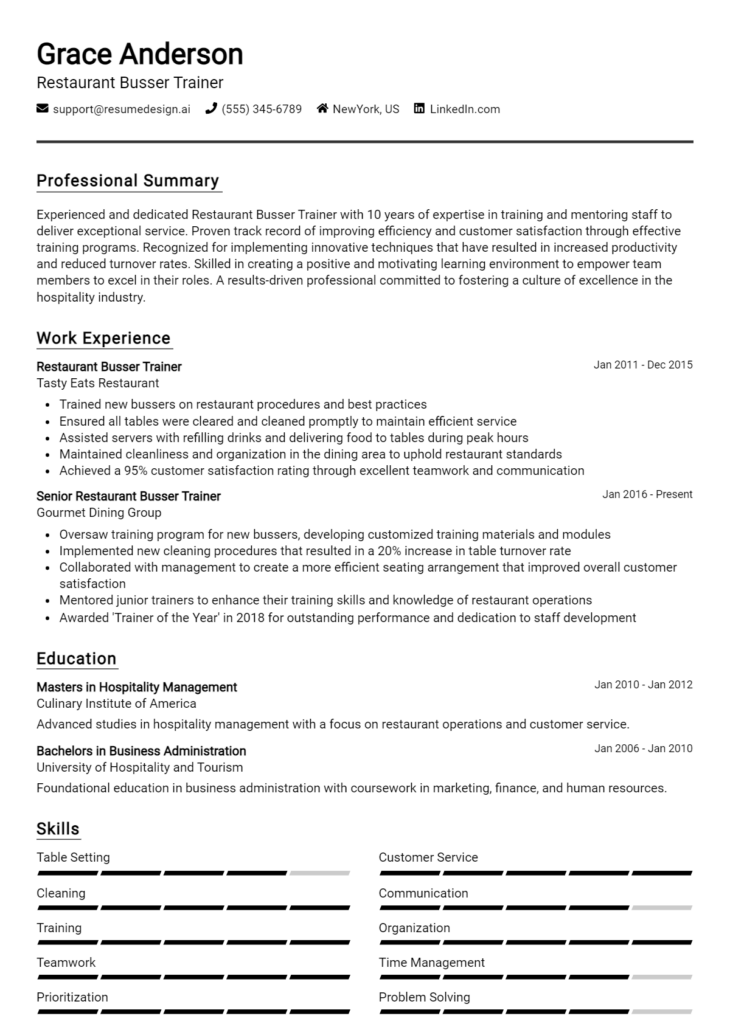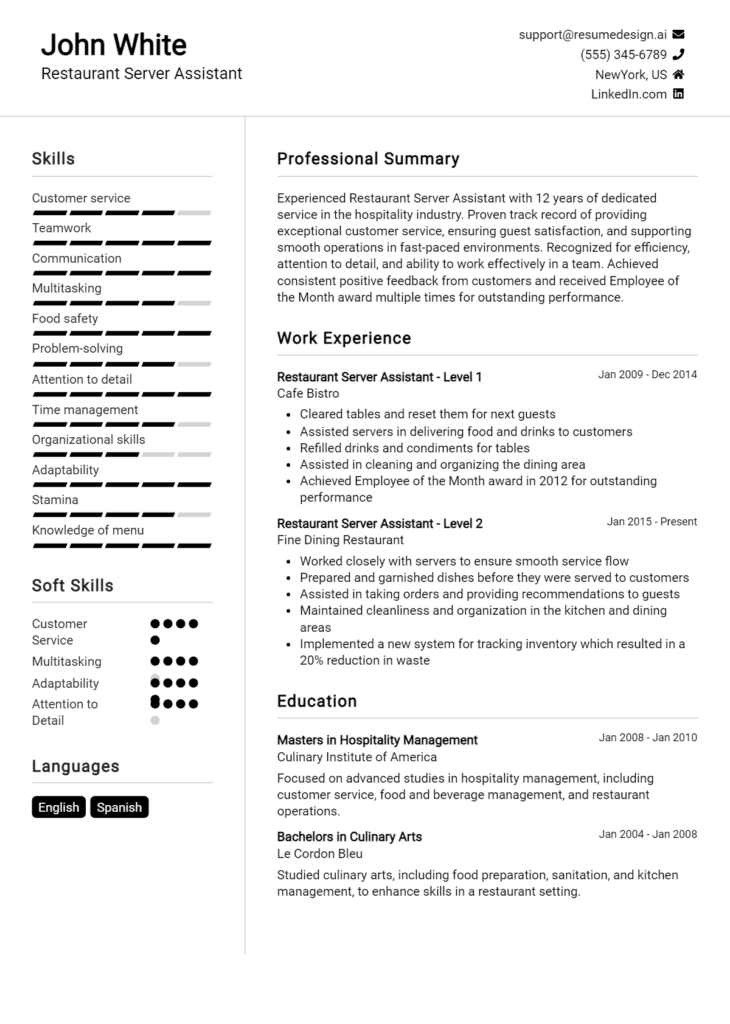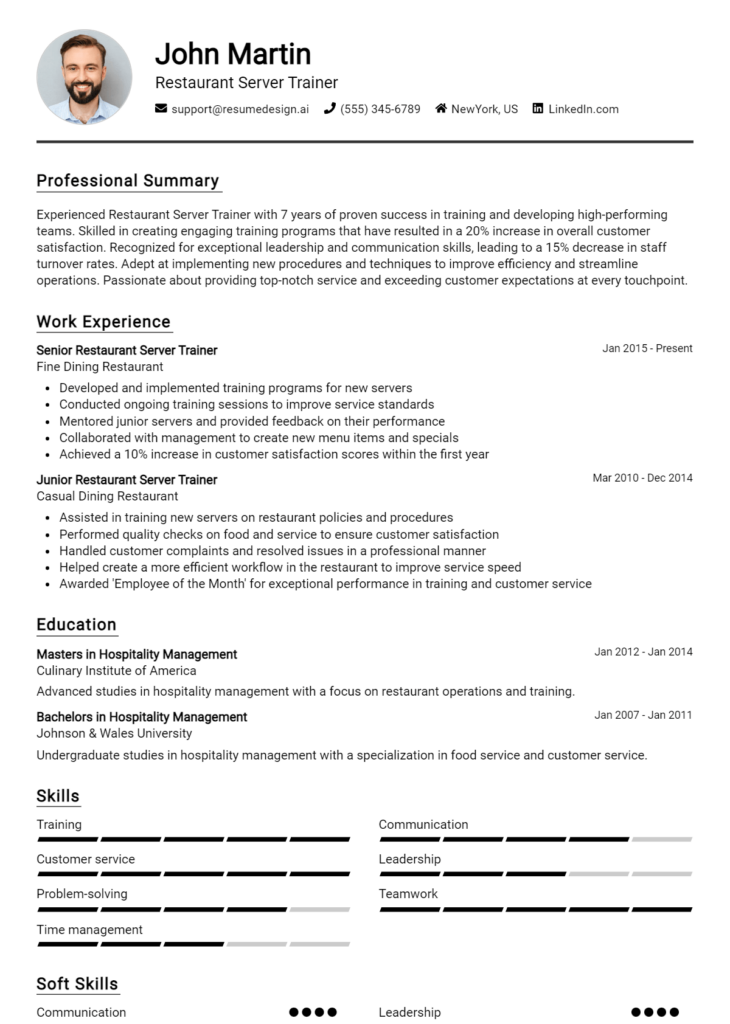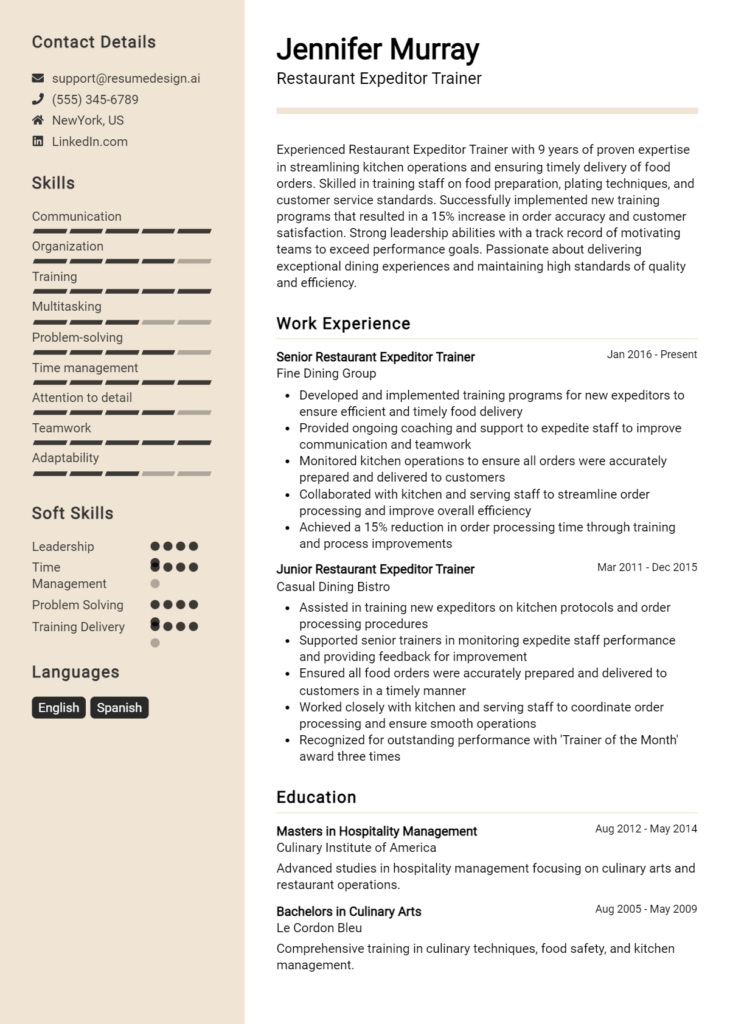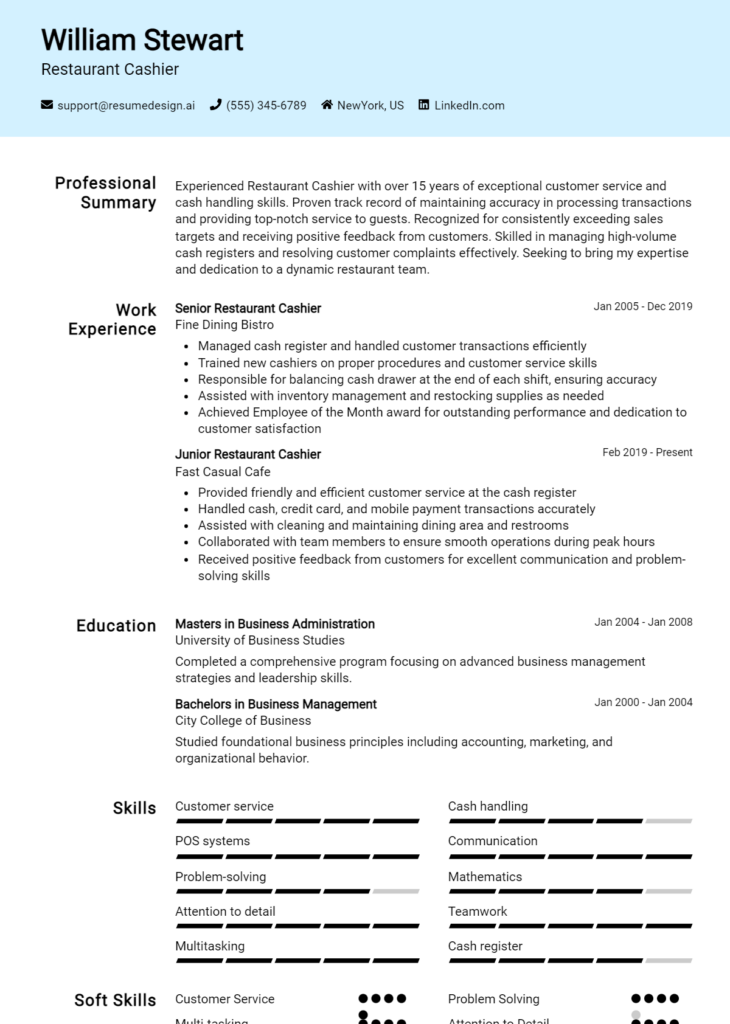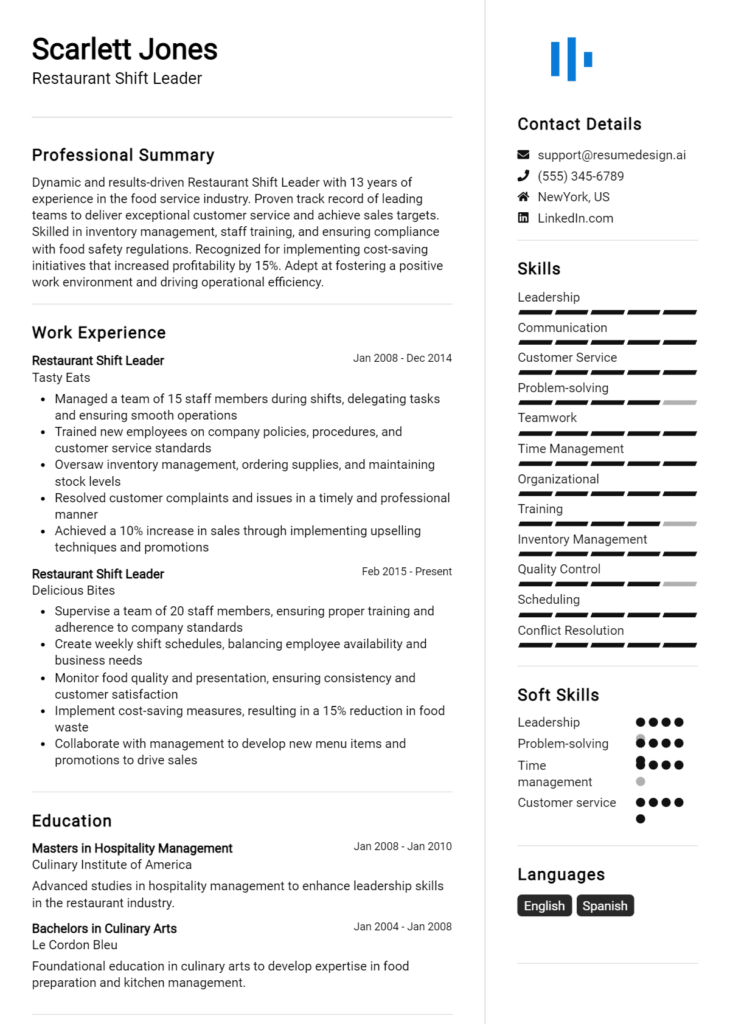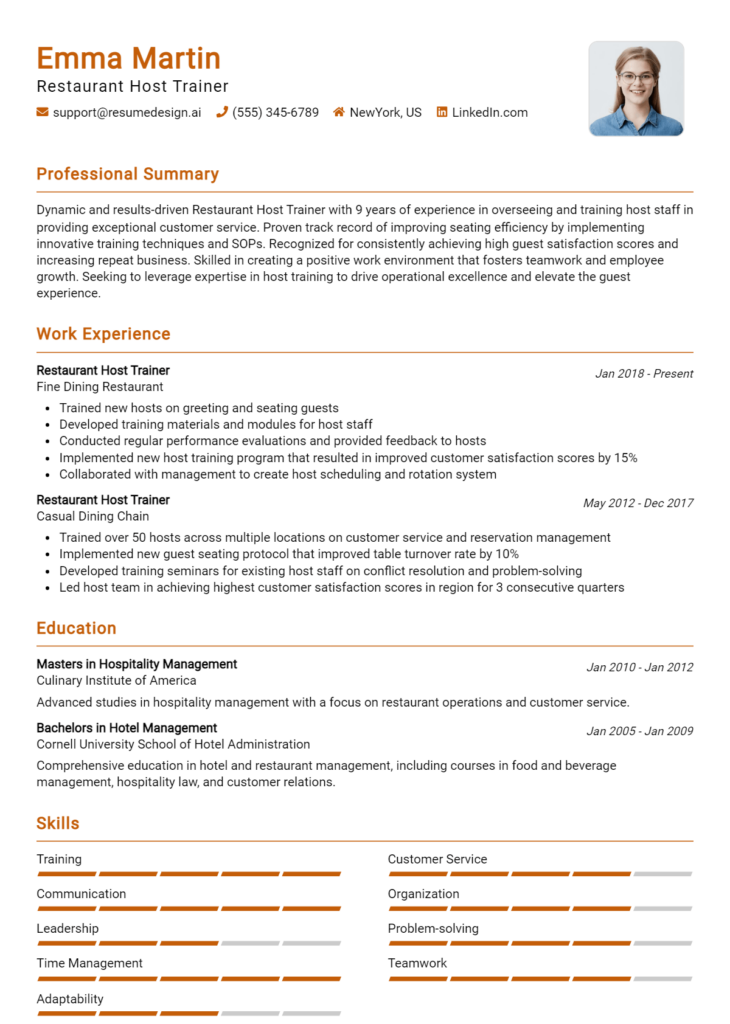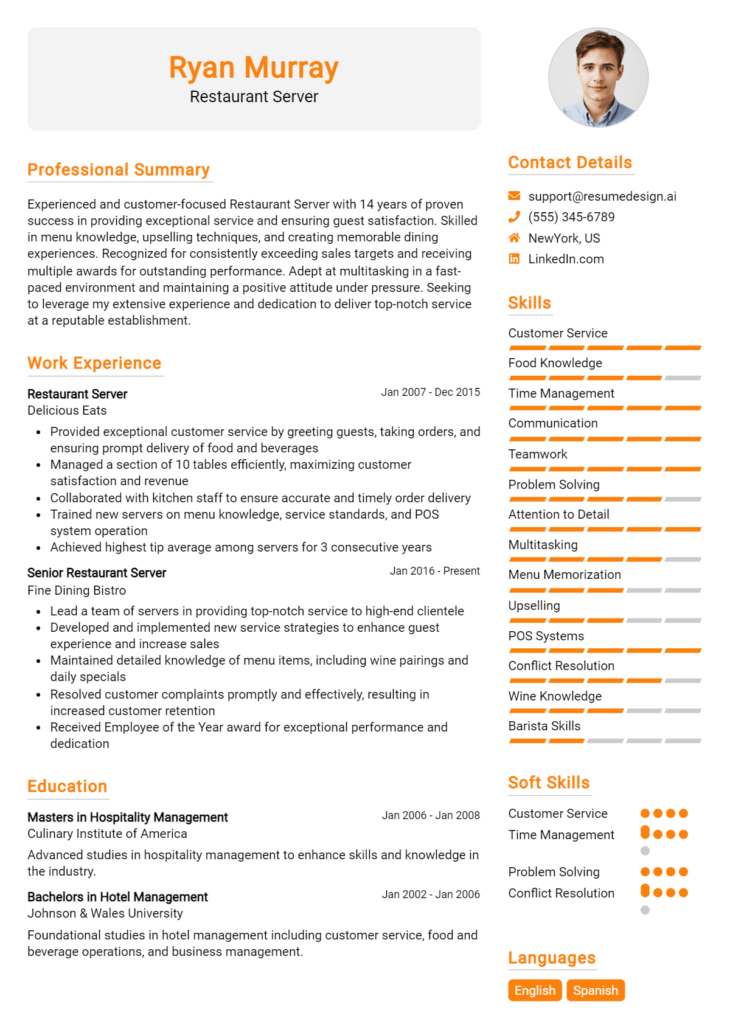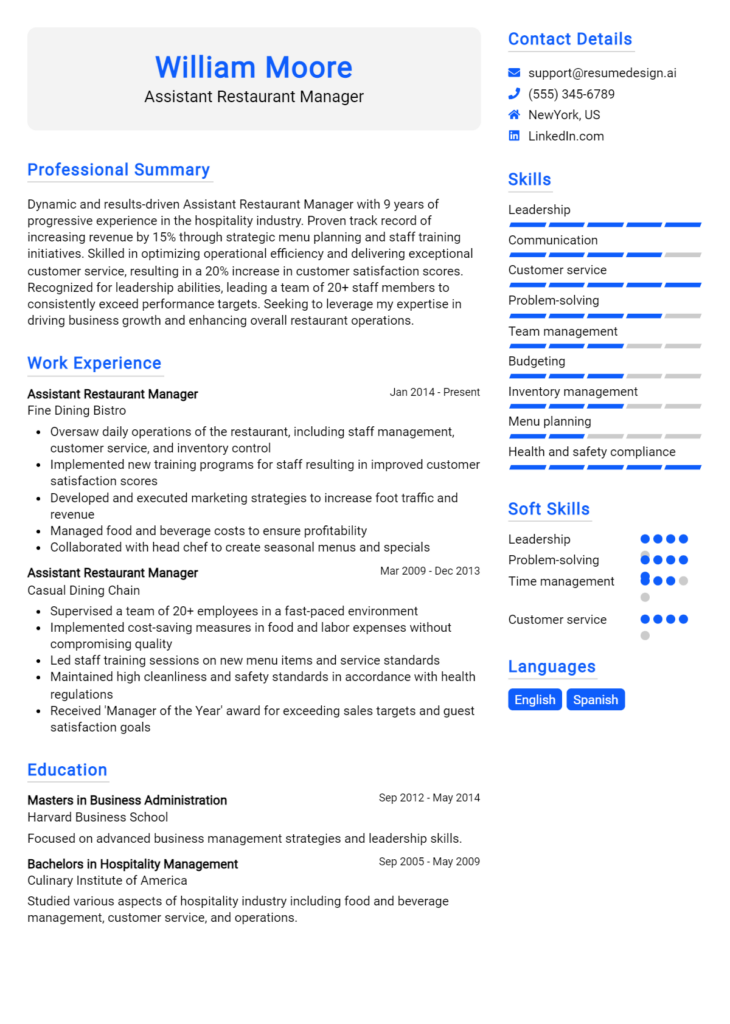Chief Financial Officer Core Responsibilities
The Chief Financial Officer (CFO) plays a pivotal role in an organization, bridging various departments such as finance, operations, and strategic planning. Key responsibilities include overseeing financial reporting, budgeting, and compliance, as well as developing financial strategies that align with business objectives. A successful CFO must possess strong technical skills, operational expertise, and exceptional problem-solving abilities to navigate complex financial landscapes. These skills are essential in driving the organization's growth and ensuring financial health, making a well-structured resume crucial for showcasing such qualifications effectively.
Common Responsibilities Listed on Chief Financial Officer Resume
- Overseeing financial planning and analysis
- Managing financial reporting and compliance
- Developing and implementing budgeting processes
- Monitoring cash flow and capital expenditure
- Assessing financial risks and opportunities
- Collaborating with other executives for strategic decision-making
- Leading financial audits and internal controls
- Managing the finance team and fostering professional development
- Communicating financial performance to stakeholders
- Formulating long-term financial strategies
- Ensuring adherence to regulatory requirements
- Advising on mergers, acquisitions, and investment opportunities
High-Level Resume Tips for Chief Financial Officer Professionals
In the competitive landscape of finance, a well-crafted resume is crucial for Chief Financial Officer (CFO) professionals looking to make a lasting impression on potential employers. Your resume often serves as the first point of contact with hiring managers, and it needs to effectively showcase not just your skills but also your significant achievements in the field. A strong resume can set you apart from other candidates, highlighting your expertise in financial strategy, risk management, and operational efficiency. This guide will provide practical and actionable resume tips specifically tailored for Chief Financial Officer professionals, helping you to present your qualifications in the best possible light.
Top Resume Tips for Chief Financial Officer Professionals
- Tailor your resume to the job description by using relevant keywords and phrases from the posting.
- Begin with a strong executive summary that encapsulates your career highlights and value proposition.
- Showcase your relevant experience in financial management, strategic planning, and operational oversight.
- Quantify your achievements using specific numbers and percentages to demonstrate the impact you've made.
- Highlight industry-specific skills such as regulatory compliance, financial forecasting, and budgeting expertise.
- Include leadership experience and examples of team development to illustrate your ability to drive organizational success.
- Utilize a clean, professional layout that enhances readability and emphasizes key points.
- Incorporate any certifications or advanced degrees, such as a CPA or MBA, that are relevant to the CFO role.
- Keep your resume concise, ideally one to two pages, focusing on the most impactful information.
- Proofread for errors and ensure clarity to present yourself as detail-oriented and professional.
By implementing these tailored tips, you can significantly increase your chances of landing a job in the Chief Financial Officer field. A polished and focused resume will not only highlight your qualifications but also demonstrate your commitment to excellence, making you a standout candidate in a competitive job market.
Why Resume Headlines & Titles are Important for Chief Financial Officer
In the competitive landscape of executive recruitment, the role of a Chief Financial Officer (CFO) is critical, and so is the presentation of qualifications through a resume. The headline or title of a resume serves as the first point of contact between the candidate and hiring managers, making it essential for capturing attention. A strong headline succinctly encapsulates a candidate’s key qualifications, skills, or accomplishments in a single impactful phrase. This not only helps in summarizing the candidate’s expertise but also aligns their experience with the specific needs of the employer, ensuring that it is both concise and relevant. An effective resume headline can significantly enhance the chances of making a memorable first impression, standing out in a sea of applicants.
Best Practices for Crafting Resume Headlines for Chief Financial Officer
- Keep it concise: Aim for one impactful sentence that summarizes your qualifications.
- Be role-specific: Tailor the headline to reflect the specific CFO position you are applying for.
- Highlight key strengths: Focus on your unique skills, experiences, or accomplishments that set you apart.
- Use action-oriented language: Employ strong verbs to convey confidence and proactivity.
- Incorporate relevant keywords: Utilize industry-specific terminology to resonate with hiring managers.
- Showcase quantifiable achievements: Mention metrics or results that underscore your contributions in previous roles.
- Avoid clichés: Steer clear of overused phrases that lack substance.
- Align with company values: Consider the employer’s mission and tailor your headline to reflect those values.
Example Resume Headlines for Chief Financial Officer
Strong Resume Headlines
Transformational CFO with 15+ Years of Experience Driving Financial Strategy and Growth.
Results-Oriented Chief Financial Officer Specializing in Cost Reduction and Profit Maximization.
Dynamic Financial Leader with Proven Track Record of Enhancing Operational Efficiency and Revenue Growth.
Weak Resume Headlines
CFO Looking for Opportunities.
Experienced Finance Professional.
The strong headlines are effective because they immediately convey specific strengths and experiences relevant to the CFO role, engaging the reader's interest right from the start. They utilize powerful language and reflect quantifiable achievements, making the candidate memorable. In contrast, the weak headlines fail to impress due to their vagueness and lack of specificity, offering minimal insight into the candidate's qualifications and not providing any compelling reason for further consideration. By avoiding generic titles, candidates can better position themselves as standout applicants in the competitive job market for executive finance positions.
Writing an Exceptional Chief Financial Officer Resume Summary
A resume summary is a critical component for any Chief Financial Officer (CFO) looking to make a strong impression on hiring managers. This brief yet impactful introduction serves as a spotlight, quickly showcasing a candidate's key skills, extensive experience, and noteworthy accomplishments that are directly relevant to the CFO role. A well-crafted summary doesn't just list qualifications; it encapsulates a professional narrative that demonstrates the candidate's capability to drive financial strategy and contribute to the overall success of the organization. In today's competitive job market, a concise and tailored summary can significantly enhance a candidate's chances of standing out and securing an interview.
Best Practices for Writing a Chief Financial Officer Resume Summary
- Quantify Achievements: Use numbers and percentages to highlight financial performance and impact.
- Focus on Key Skills: Emphasize essential CFO skills such as financial analysis, budgeting, and risk management.
- Tailor for the Job Description: Customize the summary to align with the specific requirements of the job you are applying for.
- Showcase Leadership Experience: Highlight experience in leading finance teams and driving organizational change.
- Include Industry-Specific Knowledge: Mention familiarity with regulations and trends in the relevant industry.
- Keep it Concise: Aim for 3-5 sentences that deliver a powerful message without unnecessary details.
- Use Action-Oriented Language: Start sentences with strong action verbs to convey confidence and authority.
- Highlight Strategic Vision: Illustrate your ability to align financial strategies with overall business goals.
Example Chief Financial Officer Resume Summaries
Strong Resume Summaries
Results-driven CFO with over 15 years of experience in financial leadership, successfully reducing operational costs by 20% and increasing revenue by 35% within three years. Proficient in guiding organizations through financial restructuring and implementing strategic initiatives that align with corporate objectives.
Dynamic financial executive with a proven track record in leading global finance teams, optimizing financial processes, and achieving $10M in cost savings through innovative budgeting and forecasting techniques. Expert in risk management and compliance within the technology sector.
Strategic CFO with expertise in capital markets, having successfully raised over $500M in funding for high-growth enterprises. Renowned for developing financial models that enhance decision-making and drive profitability, while fostering strong relationships with stakeholders.
Weak Resume Summaries
Experienced financial professional with a background in finance. Looking for a CFO position to utilize my skills.
CFO with many years of experience, seeking to help a company manage its finances better and improve overall performance.
The examples above illustrate the differences between strong and weak resume summaries effectively. The strong summaries are specific, quantifiable, and tailored to the CFO role, showcasing measurable results and relevant skills. In contrast, the weak summaries lack detail and fail to convey the candidate's unique value, making them less compelling to potential employers.
Work Experience Section for Chief Financial Officer Resume
The work experience section of a Chief Financial Officer (CFO) resume is critical in demonstrating a candidate's proficiency in financial leadership, strategic planning, and operational execution. This section serves as a platform to showcase the candidate's technical skills, ability to manage diverse teams, and track record of delivering high-quality financial products and services. It is essential for candidates to quantify their achievements, illustrating their impact on the organization, while aligning their experience with industry standards to effectively communicate their value to potential employers.
Best Practices for Chief Financial Officer Work Experience
- Highlight relevant technical skills, such as financial modeling, forecasting, and regulatory compliance.
- Quantify achievements with specific metrics, such as revenue growth percentages, cost reductions, or profit margins.
- Emphasize leadership experience in managing finance teams and cross-functional collaborations.
- Use action verbs to describe contributions and responsibilities, creating a dynamic impression.
- Tailor experiences to reflect industry-specific challenges and solutions.
- Include notable projects or initiatives that showcase strategic impact and innovation.
- Demonstrate a commitment to continuous improvement through professional development and certifications.
- Provide context for achievements that align with the company's goals and objectives.
Example Work Experiences for Chief Financial Officer
Strong Experiences
- Led a financial turnaround that resulted in a 25% increase in annual revenue over three years by implementing strategic budgeting and forecasting processes.
- Developed and executed a cost-reduction initiative that lowered operational expenses by 15%, enhancing profitability and cash flow.
- Managed a team of 20 finance professionals, fostering a collaborative environment that improved team productivity by 30% through training and development programs.
- Implemented a new financial reporting system that reduced reporting time by 40%, enabling faster decision-making at the executive level.
Weak Experiences
- Responsible for overseeing finance operations.
- Worked on various financial projects that may or may not have had a significant impact.
- Managed a team of finance staff without specific details about achievements or outcomes.
- Performed regular financial tasks and duties as required.
The examples listed as strong experiences are considered effective because they provide clear, quantifiable outcomes and demonstrate leadership, innovation, and collaboration. They reflect a candidate's significant contributions and strategic impact on the organization. In contrast, the weak experiences lack specificity and measurable results, making them less compelling and failing to convey the candidate's true capabilities and achievements in the CFO role.
Education and Certifications Section for Chief Financial Officer Resume
The education and certifications section of a Chief Financial Officer (CFO) resume is crucial as it showcases the candidate's academic qualifications, industry-relevant certifications, and commitment to continuous professional development. This section not only highlights the foundational knowledge gained through formal education but also emphasizes the importance of specialized training and certifications that align with the evolving demands of the finance industry. By including relevant coursework and advanced credentials, candidates can significantly enhance their credibility and demonstrate their readiness to effectively lead financial strategies and operations within an organization.
Best Practices for Chief Financial Officer Education and Certifications
- Prioritize relevant degrees such as a Master’s in Business Administration (MBA) or a Master’s in Finance.
- Highlight industry-recognized certifications such as Certified Public Accountant (CPA) or Chartered Financial Analyst (CFA).
- Include any specialized training in financial regulations, mergers and acquisitions, or risk management.
- Provide details on relevant coursework that demonstrates advanced financial knowledge and skills.
- Keep the section concise and focused on the most pertinent qualifications.
- Ensure that any certifications listed are up-to-date and reflect ongoing professional development.
- Consider including honors or distinctions received during academic pursuits to showcase excellence.
- Tailor the education and certifications section to match the specific requirements outlined in the job description.
Example Education and Certifications for Chief Financial Officer
Strong Examples
- MBA in Finance, Harvard Business School, Graduated with Honors, 2015
- Certified Public Accountant (CPA), State Board of Accountancy, 2016
- Chartered Financial Analyst (CFA), CFA Institute, 2018
- Advanced Financial Management Certificate, Wharton School, 2019
Weak Examples
- Bachelor of Arts in History, University of California, 2005
- Certification in Basic Accounting, Local Community College, 2010
- Completed a workshop on Budgeting Techniques, 2011
- Diploma in Office Administration, Online Course Provider, 2012
The strong examples listed above are considered effective because they reflect advanced degrees and widely recognized certifications that are directly relevant to the CFO role, demonstrating a solid foundation in financial management and strategic oversight. In contrast, the weak examples illustrate educational qualifications and certifications that lack relevance to the finance industry or lack the depth necessary for a leadership position, thereby diminishing the candidate's perceived expertise and readiness for a CFO role.
Top Skills & Keywords for Chief Financial Officer Resume
The role of a Chief Financial Officer (CFO) is pivotal in steering an organization towards financial stability and growth. A well-crafted resume for a CFO should highlight a blend of essential skills that demonstrate proficiency in financial management, strategic planning, and leadership. Skills not only showcase your technical capabilities but also reflect your ability to navigate complex financial landscapes and inspire teams. As you prepare your resume, it’s crucial to emphasize both hard and soft skills that align with the demands of this high-level position.
Top Hard & Soft Skills for Chief Financial Officer
Soft Skills
- Leadership
- Strategic Thinking
- Communication Skills
- Problem Solving
- Adaptability
- Emotional Intelligence
- Decision Making
- Interpersonal Skills
- Team Collaboration
- Conflict Resolution
- Negotiation Skills
- Time Management
- Visionary Thinking
- Integrity
- Stakeholder Management
Hard Skills
- Financial Analysis
- Budgeting and Forecasting
- Accounting Principles
- Risk Management
- Regulatory Compliance
- Financial Reporting
- Tax Planning
- Mergers and Acquisitions
- Cash Flow Management
- Investment Strategies
- ERP and Financial Software Proficiency
- Data Analytics
- Cost Control
- Financial Modeling
- Performance Metrics
- Business Valuation
- Corporate Finance
For a comprehensive understanding of how to effectively incorporate these skills into your resume, and to ensure your work experience aligns with the expectations of a CFO, consider tailoring your application to reflect both your accomplishments and the expertise you've developed throughout your career.
Stand Out with a Winning Chief Financial Officer Cover Letter
Dear [Hiring Manager's Name],
I am excited to submit my application for the Chief Financial Officer position at [Company Name]. With over [X years] of experience in financial leadership roles, I have developed a comprehensive skill set that aligns well with the strategic goals of your organization. My deep expertise in financial planning, analysis, and risk management has enabled me to drive substantial growth and profitability in my previous positions, and I am eager to bring this expertise to your team.
Throughout my career, I have successfully led diverse financial operations, optimizing processes that resulted in cost savings and enhanced financial performance. At [Previous Company Name], I spearheaded the implementation of a new financial reporting system that improved accuracy and reduced reporting time by [X%]. My focus on developing strong financial strategies, combined with my ability to build and lead high-performing teams, has consistently yielded results that exceed corporate expectations. I am particularly drawn to [Company Name] because of its commitment to innovation and sustainability, and I am excited about the potential to contribute to its continued success.
In addition to my technical skills, I pride myself on my ability to communicate complex financial information clearly and effectively to stakeholders at all levels. I believe that fostering a collaborative environment is essential for driving financial excellence. My experience in working closely with executive teams and board members has equipped me with the insights to align financial strategies with overarching business objectives. I am confident that my proactive approach and strategic mindset will be valuable assets to [Company Name].
I look forward to the opportunity to discuss how my background, skills, and enthusiasms align with the needs of your organization. Thank you for considering my application. I am excited about the possibility of contributing to [Company Name] as your Chief Financial Officer and am eager to bring my passion for financial leadership to your esteemed team.
Sincerely,
[Your Name]
[Your Phone Number]
[Your Email Address]
Common Mistakes to Avoid in a Chief Financial Officer Resume
When crafting a resume for a Chief Financial Officer (CFO) position, it's essential to present your qualifications, experience, and leadership skills effectively. However, many candidates make common mistakes that can undermine their chances of landing an interview. Understanding these pitfalls can help you create a compelling resume that highlights your expertise in financial strategy and management while avoiding common errors.
Neglecting Quantifiable Achievements: Failing to include specific metrics or results can make your contributions seem vague. Highlighting achievements with precise figures (e.g., revenue growth percentages, cost reductions) demonstrates your impact and effectiveness.
Using Jargon Without Context: Overloading your resume with technical jargon can alienate readers who may not be familiar with specific terms. Ensure that your language is accessible while still showcasing your expertise.
Lack of Tailoring for the Role: Submitting a generic resume can hinder your chances of standing out. Tailor your resume to the specific CFO position by aligning your skills and experiences with the job description and company goals.
Focusing on Responsibilities Instead of Results: Simply listing job duties doesn't convey your value. Shift the focus to your accomplishments and how you improved processes or contributed to the company's success.
Ignoring Soft Skills: While technical skills are crucial for a CFO, soft skills such as leadership, communication, and strategic thinking are equally important. Highlight how your interpersonal abilities have led to successful team collaboration and stakeholder engagement.
Inconsistent Formatting: A cluttered or inconsistent layout can distract from your qualifications. Use a clean, professional format with uniform headings, bullet points, and fonts to ensure readability.
Exceeding Length Recommendations: A lengthy resume can overwhelm hiring managers. Aim for a concise, one to two-page document that succinctly summarizes your career highlights and relevant experiences.
Omitting Professional Development: Neglecting to include ongoing education or certifications can make your resume seem outdated. Show your commitment to professional growth by listing relevant courses, certifications, or memberships in financial organizations.
Conclusion
As we explored the pivotal role of a Chief Financial Officer (CFO), it became clear that this position encompasses a wide range of responsibilities, from strategic financial planning to risk management and compliance oversight. The CFO is not only responsible for the financial health of the organization but also plays a critical role in guiding its overall strategy and direction.
Key points covered include:
- Strategic Leadership: The CFO must align financial strategies with the company’s goals, ensuring that resources are allocated efficiently to drive growth.
- Financial Reporting and Analysis: A strong CFO provides accurate financial reporting and insightful analysis, allowing stakeholders to make informed decisions.
- Risk Management: Identifying and mitigating financial risks is essential to protect the company's assets and ensure long-term stability.
- Team Development: Effective CFOs lead and develop finance teams, fostering a culture of accountability and performance.
In conclusion, the role of a Chief Financial Officer is both complex and vital to the success of any organization. If you're looking to step into this essential leadership role or advance your career further, it's crucial to have a standout resume that showcases your skills and experience effectively.
Take the next step in your career journey by reviewing your Chief Financial Officer resume today. Utilize resources like resume templates, resume builder, resume examples, and cover letter templates to create a compelling application that sets you apart from the competition. Don't miss the opportunity to make a lasting impression!

